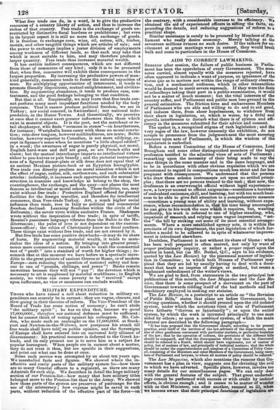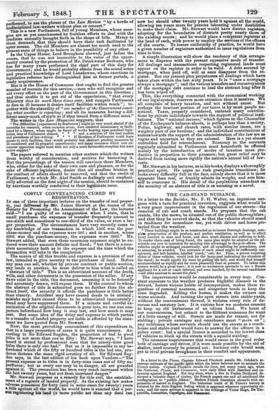AIDS TO CORRECT LAWMAKING.
SESSION after session, the failure of public business in Parlia. ment has been the opprobrium of every Government. The mea- sures carried, almost equally with the measures rejected, have often appeared to indicate a want of purpose, an ignorance of the status quo as to matters not within the range of ordinary observa- tion, and a mechanical unfitness, which in other transactions would be deemed to merit severe reproach. If they were the feats of schoolboys taking their part in a public examination, it would not be a matter of much moment; but the vital interests of the country suffer, and Parliament and public men lose ground in the general estimation. The friction tires and embarrasses Members of Parliament who are able and willing to do and to aid good, and induces them, from sheer hopelessness, to withdraw from their share in legislation, or, which is worse, by a fitful and guerilla interference to disturb what there is of system and effi- ciency in the measures submitted for their advice and consent.
The upshot is, a recognized stigma of rash legislation ; and the
very sages of the law, however unseemly the exhibition, do not scruple to pronounce from the judgment-seat the most sneering censures upon acts of Parliament, in which the wisdom of the Legislature is embodied. Before a recent Committee of the House of Commons, Lord Brougham and some other distinguished members of the legal profession testified to the admitted vices of acts of Parliament ; remarking upon the necessity of their being made to say the same things in the same manner and in the game language, and to be in accordance with other obvious requisites which we are accustomed to regard in compositions much leas strict and far less pregnant with consequences. We understand that the persOns who draw these solemn instruments act 'apes no settled princi- ples ; that there areno persons trained to thetask ; tharnew, the draftsman is an overwrought official without legal experience— now, a lawyer unused to official exigencies—sometimes a barrister of undoubted eminence,skill, and learning, but with too much busi- ness to be able to give full attention to a comprehensive measure —sometimes a young man of ability and learning, without expe- rience, 'whose recommendation is, that his time being unoccupied he can give to his work the care which it requires, but, wanting authority, his work is referred to one of higher standing, who, impatient of research and relying upon vague impressions, " set- tles " the bill by striking out some of its most essential arrange- ments. Where a more established agency acts, it is within the precincts of its own department, the past legislation of which fur- nishes a model to be adhered to in spite of whatsoever improve- ment is introduced elsewhere.
Doubtless, Parliament is not without its share of blame: what
has been well prepared is often marred, not only by want of proper preliminary inquiry, or rather a proper report upon the matter in hand, but (as Mr. Bethel, Q.C., says in his evidence, quoted by the Law Review) by the piecemeal manner of legisla- tion in Committee ; to which both Houses of Parliament may plead that they are led by usually having to deal with a docu- ment that bears no impress of d.esign. or method, but seems a haphazard embodiment of the writer's views.
We are glad to find, from statements in the two principal law
publications of this month, the Law Magazine and the Law Re- view, that there is some prospect of a movement on the part of Government towards ridding itself of the bad methods and bad machinery employed in making our statutes.
The Law Review, in a postscript to an article on "the Revision
of Public Bills," states that plans are before Government, in- volving questions, whether it should proceed upon the old isolated system, under which the notorious vices of acts of Parliament have hitherto "thriven ao luxuriantly " ; or upon the united system, by which the work is intrusted principally to one man aided by others ; or upon a combined system, of wraith the main features are described in the following paragraph— "It has been proposed that the Government should, according to its present
practice, avail itself of the services of the law-advisers of the departments, and also of other gentlemen conversant with particular matters, or particular branches of the law; that by the operation of indexes, the provisions of the different bills should be compared, and that the discrepancies which may thus be discovered should be referred to a Board, which should have cognizance, not of matter of policy, but of matters of law, and principally of technical matters; that the whole should be under the superintendence and auspices of a Committee of Privy Coun- cil, consisting of the Ministers and other Members of the Government, being mem- bers of Parliament and lawyers, to whom all matters of policy should be referred."
The Law Magazine, which also mentions the rumour that Go- vernment has a plan in view, suggests one for obviating the evil to which we have adverted. Specific plans, however, involve too many details for our miscellaneous pages. We can only deal with the general features of the subject. That great undertak- ings cannot be performed with success or with credit by isolated efforts, is obvious enough ; and it ceases to be matter of wonder with us that Ministers, one after another, succeed so ill, when we become aware that their principal functions of legislation are performed, to use the phrase of the Lam Review "by a horde of undisciplined law-writers without plan or concert." This is a new Parliament, full of young Members' whose ener- gies are as yet unexhausted by fruitless efforts to deal with the crudities annually brought forth in the shape of bills. Mercy to them demands that they should have their task facilitated by apter means. The old Members are almost too much used to the present state of things to believe in the possibility of any other. In the Upper House, Lord Brougham showed, just before the recess, that he was not insensible to the value of the oppor- tunity created by the promotion of Mr. Drinkwater Bethune, who has for many years performed the chief part of this duty for Government; and he would probably obtain from the sound sense and practical knowledge of Lord Lansdowne, whose exertions in legislative reforms have distinguished him at former periods, a ready acquiescence. But it is the House of Commons that ought to find the greater number of recruits for this service, men who will recognize and aid every effort on the part of the Government in this direction ; and thus enable it to get rid of the opprobrium, " that every Ministry does its work three times over, and compels Parliament to fare as ill because it denies itself facilities within reach"; to- gether with the absurdity of "one member of the Government enact- ing what another is repealing; and all its measures having a dif- ferent assay-mark of style as if they issued from a different mint." The writer in the Law Magazine suggests, that "The difficulties [experienced by draftsmen] might be very much abated if the necessity for research, when occasion arose, were rendered unnecessary or facili- tated by a library, where might be found all works bearing upon practical legis- lation, acts of Parliament classed, • a • and a selection of the best models and precedents of law-writing. • • • If Members of Parliament could have access to such facilities, they would probably less obstruct pending measures by ill-considered and ill-prepared amendments; and many measures which now en- counter opposition might meet with not only a more favourable reception but more active support."
The papers referred to mention other matters which the writers deem worthy of consideration, and motives for bestowing it. But the proceedings of the session will convince those Members, who, either for the sake of their own ease and pleasure, or for the sake of efficient legislation, desire that all needless friction in the conduct of affairs should be removed, and that the credit of Parliament, to which Mr. Abel Smith so feelingly and emphati- cally adverted on the first night of the session, should be sustained by exertions worthily conducted to their legitimate issue.



























 Previous page
Previous page